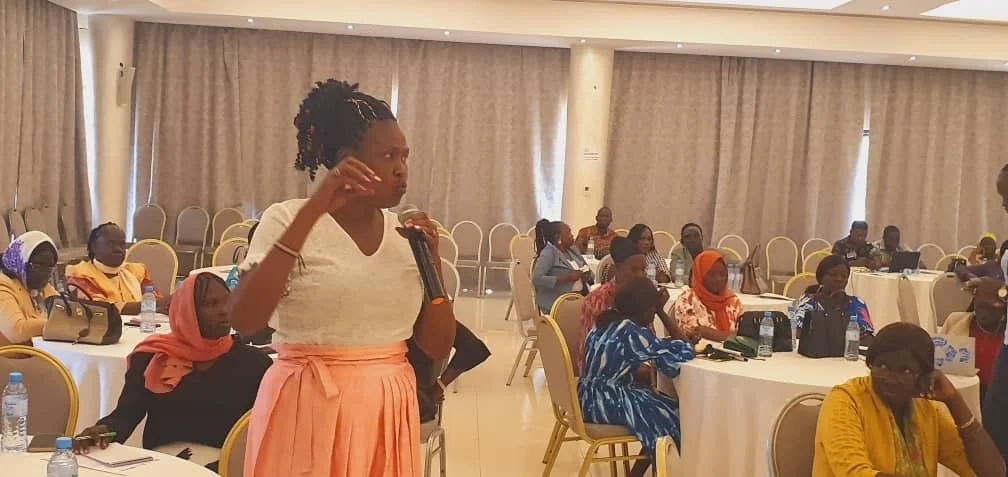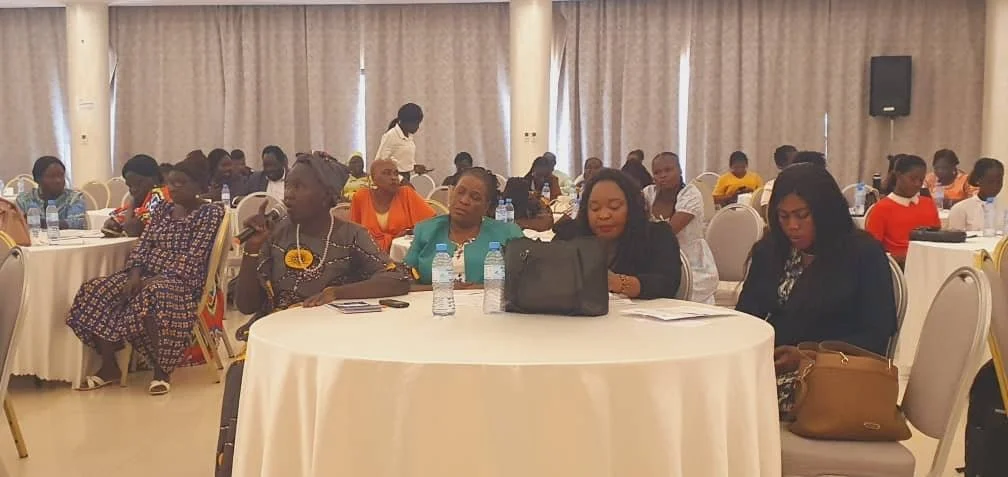Women leaders chart path to realize South Sudan’s commitment for women’s participation
Delegates at the The Constitutional Commitment of at least Thirty-Five Percent (35%): Are We There conference in Juba
Women’s rights activists in South Sudan have agreed a way forward to ensure the country achieves its commitment to at least 35 per cent level of women’s participation in all transitional institutions.
Meeting as part of a two-day conference in Juba, the activists have resolved to a serious of actions that will promote the participation of women. These include establishing a specialized institution for political training, mentorship, and financial empowerment for women; creating an independent commission and a presidential envoy to monitor gender policies; and enhancing collaboration among women leaders to promote a unified agenda.
Additional strategies focus on increasing women’s representation in decision-making roles, safeguarding existing positions, and empowering women economically through financial literacy, cooperative organizations, and support for women-led businesses at national and international levels.
The Revitalized Agreement for Resolution of Conflict in South Sudan (R-ARCSS), the peace deal finalized in 2018, includes a quota for women’s participation of 35 per cent, which has not yet been met. Conference participants aim to finally realize the advances that the government has committed to.
Organizations signed up to the communique include Karama partner the Center for Inclusive Governance, Peace, and Justice (CIGPJ), as well as the South Sudan Democratic Engagement Monitoring and Observation Program (SSuDEMOP) and the South Sudan Women Empowerment Network (SSWEN).
Read the full communique below.
Delegates at the The Constitutional Commitment of at least Thirty-Five Percent (35%): Are We There conference in Juba
Communique from the Women in Politics Conference
Juba, South Sudan, December 19-20, 2024
PREAMBLE
We, the participants of the Conference on Women and Politics, convened under the theme “The Constitutional Commitment of at least Thirty-Five Percent (35%): Are We There?” at the Imperial Plaza Hotel, Juba, South Sudan, on December 19-20, 2024
Cognizant that, the Revitalized Agreement on the Resolution of the Conflict in the Republic of South Sudan (R-ARCSS) provides a vital legal framework for peace, stability, and reforms, including the enhancement of gender equality through the Affirmative Action commitment of at least thirty-five percent (35%) as stipulated in the Transitional constitution of the Republic of South Sudan 2011, as amended.
Aware that, the meaningful political participation and representation of women are critical to achieving inclusive governance, sustainable development, and societal transformation in South Sudan.
Recognizing, the historical and systemic barriers that have hindered women’s full participation in political, economic, and social processes, necessitating deliberate and sustained efforts to address these challenges.
Acknowledging that, the increase in the Affirmative Action quota from 25% to thirty- five percent (35%) in the R-ARCSS reflects an important step forward; the women are concerns about the inconsistency in its implementation.
Considering that, the Transitional period and the upcoming December 2026 elections and the constitution-making process present unique opportunities to embed gender equality and strengthen women’s meaningful political at all levels of governance and society.
Have, therefore, resolved, at this Conference on Women and Politics, convened under the theme “The Constitutional Commitment of at least Thirty-Five Percent (35%): Are We There?” at the Imperial Plaza Hotel, Juba, South Sudan, on December 19-20, 2024;
The conference resolved the following.
Commit to fostering a unified understanding of the history, purpose, and politics behind women's 35% Affirmative Action. This is with an aim to advance women's meaningful participation and representation in public life.
Establish a specialized institution for training Women on Politics. This will facilitate mentorship, financial empowerment and multi-generational dialogue amongst women to meaningfully participate in political affairs of the country at national and sub-national.
Create an independent commission on women affairs and a position of presidential envoy on women affairs to track and monitor compliance with policies promoting women's engagement in politics and public affairs.
Enhance communication, coordination, and collaboration among women leaders across political affiliations to advance a unified women’s agenda. This includes forming women’s political forums and strengthening women-led, registered political parties to increase the participation of women in politics.
Develop strategies to increase the number of women in decision-making positions while safeguarding their current seats in such roles.
Consolidate efforts of women in micro and macro-economic sector through financial literacy, saving and credit cooperative organizations and linking South Sudanese women SMEs to national, regional and International.


